Deqing Yang
Think Fast and Slow: Step-Level Cognitive Depth Adaptation for LLM Agents
Feb 13, 2026Abstract:Large language models (LLMs) are increasingly deployed as autonomous agents for multi-turn decision-making tasks. However, current agents typically rely on fixed cognitive patterns: non-thinking models generate immediate responses, while thinking models engage in deep reasoning uniformly. This rigidity is inefficient for long-horizon tasks, where cognitive demands vary significantly from step to step, with some requiring strategic planning and others only routine execution. In this paper, we introduce CogRouter, a framework that trains agents to dynamically adapt cognitive depth at each step. Grounded in ACT-R theory, we design four hierarchical cognitive levels ranging from instinctive responses to strategic planning. Our two-stage training approach includes Cognition-aware Supervised Fine-tuning (CoSFT) to instill stable level-specific patterns, and Cognition-aware Policy Optimization (CoPO) for step-level credit assignment via confidence-aware advantage reweighting. The key insight is that appropriate cognitive depth should maximize the confidence of the resulting action. Experiments on ALFWorld and ScienceWorld demonstrate that CogRouter achieves state-of-the-art performance with superior efficiency. With Qwen2.5-7B, it reaches an 82.3% success rate, outperforming GPT-4o (+40.3%), OpenAI-o3 (+18.3%), and GRPO (+14.0%), while using 62% fewer tokens.
Outcome-Grounded Advantage Reshaping for Fine-Grained Credit Assignment in Mathematical Reasoning
Jan 12, 2026Abstract:Group Relative Policy Optimization (GRPO) has emerged as a promising critic-free reinforcement learning paradigm for reasoning tasks. However, standard GRPO employs a coarse-grained credit assignment mechanism that propagates group-level rewards uniformly to to every token in a sequence, neglecting the varying contribution of individual reasoning steps. We address this limitation by introducing Outcome-grounded Advantage Reshaping (OAR), a fine-grained credit assignment mechanism that redistributes advantages based on how much each token influences the model's final answer. We instantiate OAR via two complementary strategies: (1) OAR-P, which estimates outcome sensitivity through counterfactual token perturbations, serving as a high-fidelity attribution signal; (2) OAR-G, which uses an input-gradient sensitivity proxy to approximate the influence signal with a single backward pass. These importance signals are integrated with a conservative Bi-Level advantage reshaping scheme that suppresses low-impact tokens and boosts pivotal ones while preserving the overall advantage mass. Empirical results on extensive mathematical reasoning benchmarks demonstrate that while OAR-P sets the performance upper bound, OAR-G achieves comparable gains with negligible computational overhead, both significantly outperforming a strong GRPO baseline, pushing the boundaries of critic-free LLM reasoning.
Confidence Estimation for LLMs in Multi-turn Interactions
Jan 05, 2026Abstract:While confidence estimation is a promising direction for mitigating hallucinations in Large Language Models (LLMs), current research dominantly focuses on single-turn settings. The dynamics of model confidence in multi-turn conversations, where context accumulates and ambiguity is progressively resolved, remain largely unexplored. Reliable confidence estimation in multi-turn settings is critical for many downstream applications, such as autonomous agents and human-in-the-loop systems. This work presents the first systematic study of confidence estimation in multi-turn interactions, establishing a formal evaluation framework grounded in two key desiderata: per-turn calibration and monotonicity of confidence as more information becomes available. To facilitate this, we introduce novel metrics, including a length-normalized Expected Calibration Error (InfoECE), and a new "Hinter-Guesser" paradigm for generating controlled evaluation datasets. Our experiments reveal that widely-used confidence techniques struggle with calibration and monotonicity in multi-turn dialogues. We propose P(Sufficient), a logit-based probe that achieves comparatively better performance, although the task remains far from solved. Our work provides a foundational methodology for developing more reliable and trustworthy conversational agents.
ComLQ: Benchmarking Complex Logical Queries in Information Retrieval
Nov 15, 2025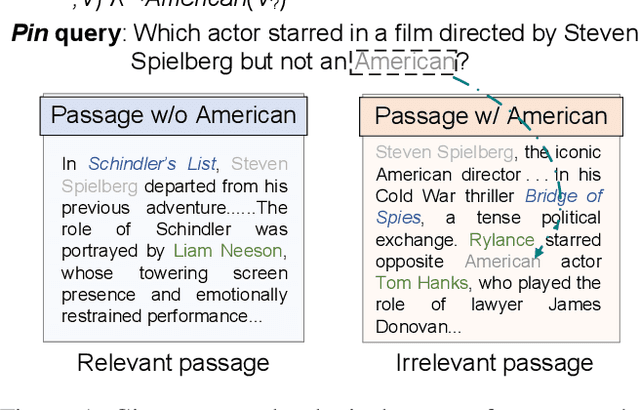

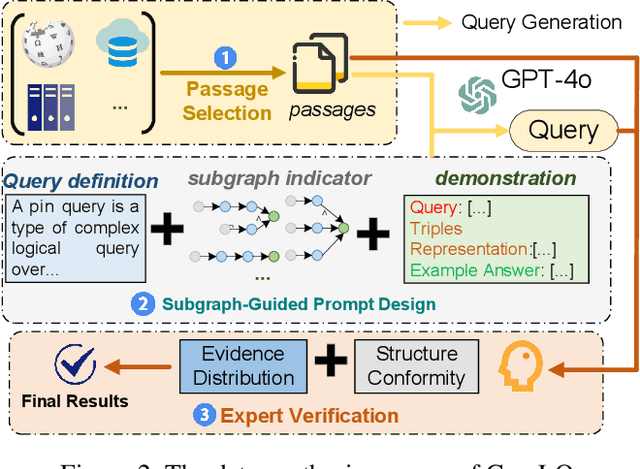
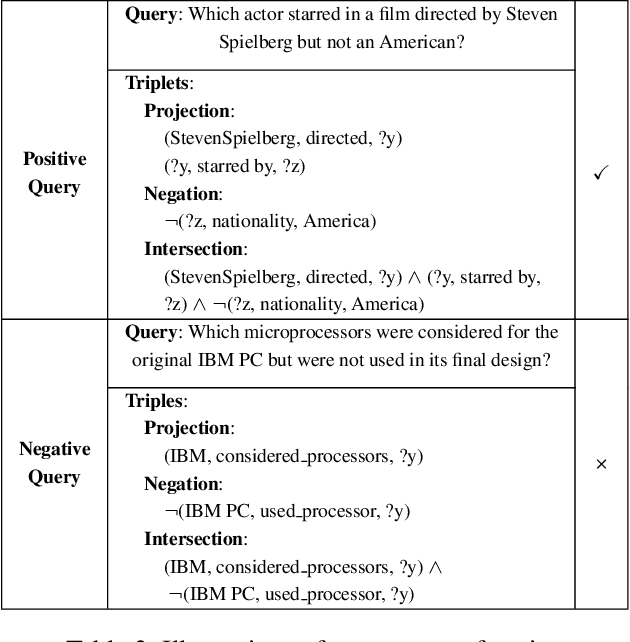
Abstract:Information retrieval (IR) systems play a critical role in navigating information overload across various applications. Existing IR benchmarks primarily focus on simple queries that are semantically analogous to single- and multi-hop relations, overlooking \emph{complex logical queries} involving first-order logic operations such as conjunction ($\land$), disjunction ($\lor$), and negation ($\lnot$). Thus, these benchmarks can not be used to sufficiently evaluate the performance of IR models on complex queries in real-world scenarios. To address this problem, we propose a novel method leveraging large language models (LLMs) to construct a new IR dataset \textbf{ComLQ} for \textbf{Com}plex \textbf{L}ogical \textbf{Q}ueries, which comprises 2,909 queries and 11,251 candidate passages. A key challenge in constructing the dataset lies in capturing the underlying logical structures within unstructured text. Therefore, by designing the subgraph-guided prompt with the subgraph indicator, an LLM (such as GPT-4o) is guided to generate queries with specific logical structures based on selected passages. All query-passage pairs in ComLQ are ensured \emph{structure conformity} and \emph{evidence distribution} through expert annotation. To better evaluate whether retrievers can handle queries with negation, we further propose a new evaluation metric, \textbf{Log-Scaled Negation Consistency} (\textbf{LSNC@$K$}). As a supplement to standard relevance-based metrics (such as nDCG and mAP), LSNC@$K$ measures whether top-$K$ retrieved passages violate negation conditions in queries. Our experimental results under zero-shot settings demonstrate existing retrieval models' limited performance on complex logical queries, especially on queries with negation, exposing their inferior capabilities of modeling exclusion.
Accelerated Evolving Set Processes for Local PageRank Computation
Oct 09, 2025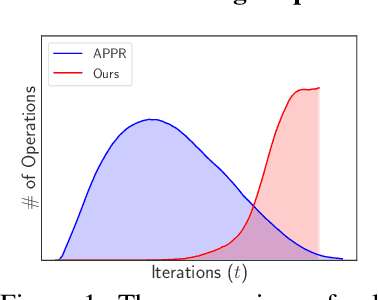
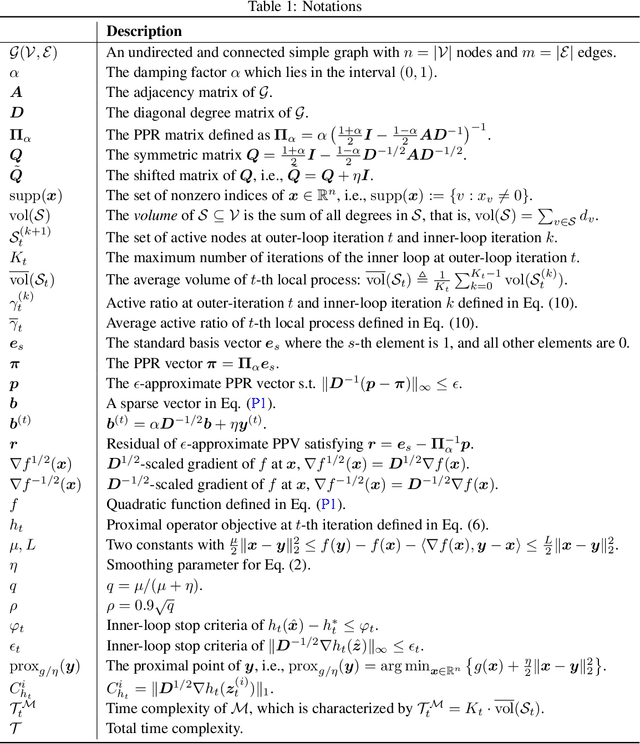
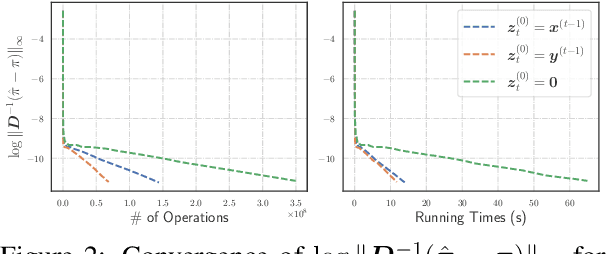
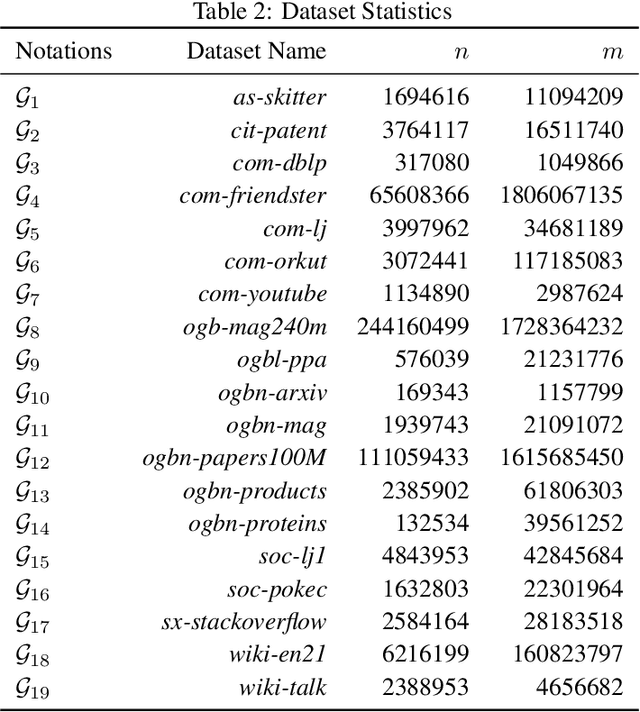
Abstract:This work proposes a novel framework based on nested evolving set processes to accelerate Personalized PageRank (PPR) computation. At each stage of the process, we employ a localized inexact proximal point iteration to solve a simplified linear system. We show that the time complexity of such localized methods is upper bounded by $\min\{\tilde{\mathcal{O}}(R^2/\epsilon^2), \tilde{\mathcal{O}}(m)\}$ to obtain an $\epsilon$-approximation of the PPR vector, where $m$ denotes the number of edges in the graph and $R$ is a constant defined via nested evolving set processes. Furthermore, the algorithms induced by our framework require solving only $\tilde{\mathcal{O}}(1/\sqrt{\alpha})$ such linear systems, where $\alpha$ is the damping factor. When $1/\epsilon^2\ll m$, this implies the existence of an algorithm that computes an $\ epsilon $-approximation of the PPR vector with an overall time complexity of $\tilde{\mathcal{O}}\left(R^2 / (\sqrt{\alpha}\epsilon^2)\right)$, independent of the underlying graph size. Our result resolves an open conjecture from existing literature. Experimental results on real-world graphs validate the efficiency of our methods, demonstrating significant convergence in the early stages.
Curse of Knowledge: When Complex Evaluation Context Benefits yet Biases LLM Judges
Sep 03, 2025Abstract:As large language models (LLMs) grow more capable, they face increasingly diverse and complex tasks, making reliable evaluation challenging. The paradigm of LLMs as judges has emerged as a scalable solution, yet prior work primarily focuses on simple settings. Their reliability in complex tasks--where multi-faceted rubrics, unstructured reference answers, and nuanced criteria are critical--remains understudied. In this paper, we constructed ComplexEval, a challenge benchmark designed to systematically expose and quantify Auxiliary Information Induced Biases. We systematically investigated and validated 6 previously unexplored biases across 12 basic and 3 advanced scenarios. Key findings reveal: (1) all evaluated models exhibit significant susceptibility to these biases, with bias magnitude scaling with task complexity; (2) notably, Large Reasoning Models (LRMs) show paradoxical vulnerability. Our in-depth analysis offers crucial insights for improving the accuracy and verifiability of evaluation signals, paving the way for more general and robust evaluation models.
GORACS: Group-level Optimal Transport-guided Coreset Selection for LLM-based Recommender Systems
Jun 04, 2025Abstract:Although large language models (LLMs) have shown great potential in recommender systems, the prohibitive computational costs for fine-tuning LLMs on entire datasets hinder their successful deployment in real-world scenarios. To develop affordable and effective LLM-based recommender systems, we focus on the task of coreset selection which identifies a small subset of fine-tuning data to optimize the test loss, thereby facilitating efficient LLMs' fine-tuning. Although there exist some intuitive solutions of subset selection, including distribution-based and importance-based approaches, they often lead to suboptimal performance due to the misalignment with downstream fine-tuning objectives or weak generalization ability caused by individual-level sample selection. To overcome these challenges, we propose GORACS, which is a novel Group-level Optimal tRAnsport-guided Coreset Selection framework for LLM-based recommender systems. GORACS is designed based on two key principles for coreset selection: 1) selecting the subsets that minimize the test loss to align with fine-tuning objectives, and 2) enhancing model generalization through group-level data selection. Corresponding to these two principles, GORACS has two key components: 1) a Proxy Optimization Objective (POO) leveraging optimal transport and gradient information to bound the intractable test loss, thus reducing computational costs by avoiding repeated LLM retraining, and 2) a two-stage Initialization-Then-Refinement Algorithm (ITRA) for efficient group-level selection. Our extensive experiments across diverse recommendation datasets and tasks validate that GORACS significantly reduces fine-tuning costs of LLMs while achieving superior performance over the state-of-the-art baselines and full data training. The source code of GORACS are available at https://github.com/Mithas-114/GORACS.
Logical Consistency is Vital: Neural-Symbolic Information Retrieval for Negative-Constraint Queries
May 29, 2025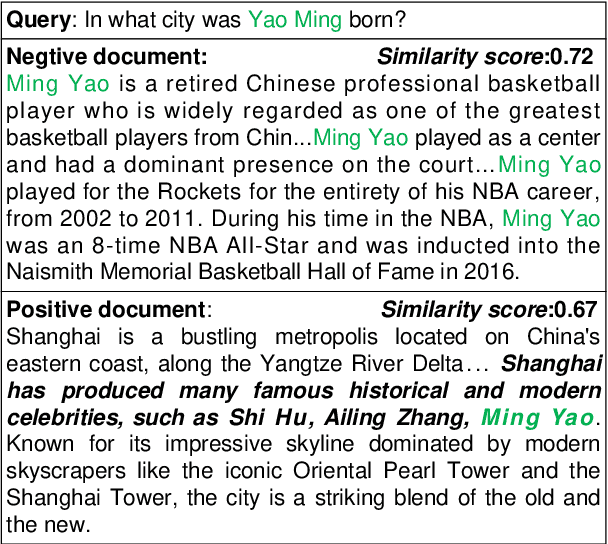

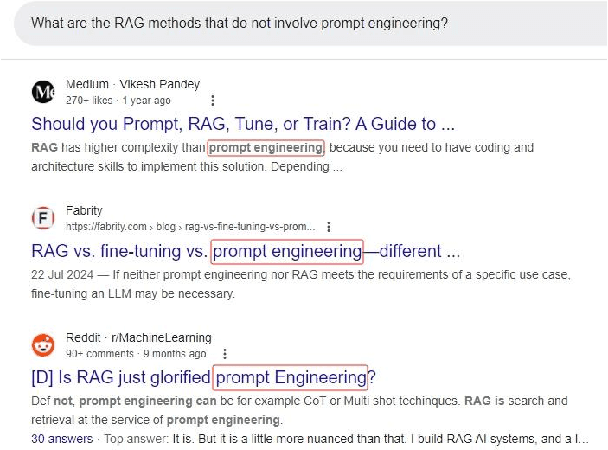
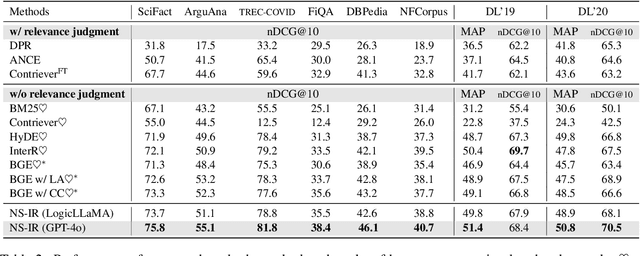
Abstract:Information retrieval plays a crucial role in resource localization. Current dense retrievers retrieve the relevant documents within a corpus via embedding similarities, which compute similarities between dense vectors mainly depending on word co-occurrence between queries and documents, but overlook the real query intents. Thus, they often retrieve numerous irrelevant documents. Particularly in the scenarios of complex queries such as \emph{negative-constraint queries}, their retrieval performance could be catastrophic. To address the issue, we propose a neuro-symbolic information retrieval method, namely \textbf{NS-IR}, that leverages first-order logic (FOL) to optimize the embeddings of naive natural language by considering the \emph{logical consistency} between queries and documents. Specifically, we introduce two novel techniques, \emph{logic alignment} and \emph{connective constraint}, to rerank candidate documents, thereby enhancing retrieval relevance. Furthermore, we construct a new dataset \textbf{NegConstraint} including negative-constraint queries to evaluate our NS-IR's performance on such complex IR scenarios. Our extensive experiments demonstrate that NS-IR not only achieves superior zero-shot retrieval performance on web search and low-resource retrieval tasks, but also performs better on negative-constraint queries. Our scource code and dataset are available at https://github.com/xgl-git/NS-IR-main.
UNCLE: Uncertainty Expressions in Long-Form Generation
May 22, 2025Abstract:Large Language Models (LLMs) are prone to hallucination, particularly in long-form generations. A promising direction to mitigate hallucination is to teach LLMs to express uncertainty explicitly when they lack sufficient knowledge. However, existing work lacks direct and fair evaluation of LLMs' ability to express uncertainty effectively in long-form generation. To address this gap, we first introduce UNCLE, a benchmark designed to evaluate uncertainty expression in both long- and short-form question answering (QA). UNCLE spans five domains and comprises 4k long-form QA instances and over 20k short-form QA pairs. Our dataset is the first to directly bridge short- and long-form QA with paired questions and gold-standard answers. Along with the benchmark, we propose a suite of new metrics to assess the models' capabilities to selectively express uncertainty. Using UNCLE, we then demonstrate that current models fail to convey uncertainty appropriately in long-form generation. We further explore both prompt-based and training-based methods to improve models' performance, with the training-based methods yielding greater gains. Further analysis of alignment gaps between short- and long-form uncertainty expression highlights promising directions for future research using UNCLE.
RLAP: A Reinforcement Learning Enhanced Adaptive Planning Framework for Multi-step NLP Task Solving
May 17, 2025Abstract:Multi-step planning has been widely employed to enhance the performance of large language models (LLMs) on downstream natural language processing (NLP) tasks, which decomposes the original task into multiple subtasks and guide LLMs to solve them sequentially without additional training. When addressing task instances, existing methods either preset the order of steps or attempt multiple paths at each step. However, these methods overlook instances' linguistic features and rely on the intrinsic planning capabilities of LLMs to evaluate intermediate feedback and then select subtasks, resulting in suboptimal outcomes. To better solve multi-step NLP tasks with LLMs, in this paper we propose a Reinforcement Learning enhanced Adaptive Planning framework (RLAP). In our framework, we model an NLP task as a Markov decision process (MDP) and employ an LLM directly into the environment. In particular, a lightweight Actor model is trained to estimate Q-values for natural language sequences consisting of states and actions through reinforcement learning. Therefore, during sequential planning, the linguistic features of each sequence in the MDP can be taken into account, and the Actor model interacts with the LLM to determine the optimal order of subtasks for each task instance. We apply RLAP on three different types of NLP tasks and conduct extensive experiments on multiple datasets to verify RLAP's effectiveness and robustness.
 Add to Chrome
Add to Chrome Add to Firefox
Add to Firefox Add to Edge
Add to Edge